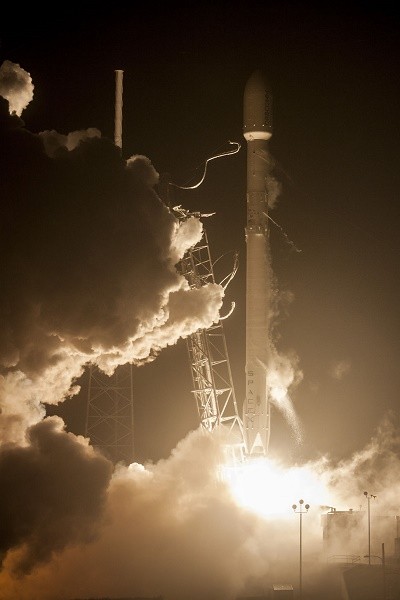By Ana Verayo, | February 24, 2016

Falcon 9
SpaceX just completed a crucial pre-launch test last Monday of one of its reusable Falcon 9 rockets that will launch once more from Cape Canaveral Air Force Station, Florida today.
Like Us on Facebook
The satellite launch window will last from 6:46 P.M. ET to 8:23 P.M. ET Wednesday evening where SpaceX will launch an SES-9 communications satellite probe, weighing 11,750 pounds into lower Earth orbit over Asia, as the Falcon 9 will attempt another rocket landing back to the surface of the planet.
SpaceX has been trying to establish its reusable Falcon 9 rockets that can fly back after launching a satellite or spacecraft into space and then returning back to Earth for other missions. The first stage of Falcon 9 will then land on a floating ocean platform off the coast of Florida.
This event will be broadcasted live from here.
This event also marks the fourth time that the private space company will attempt this precise, vertical landing as prior attempts have failed in explosions and rockets tipping over the barge. If today's landing is successful, this will become the first time that a SpaceX Falcon 9 rocket would have successfully landed on a floating ocean platform.
Past successful attempts involve landing its rocket on the Landing Zone 1 site at Cape Canaveral last December, which makes it more challenging for technicals to complete a touchdown on a floating barge than on land.
This is mainly due to different kinds of space missions, depending whether it is a satellite launch for lower orbit or missions that transport cargo to the International Space Station which is located in higher orbits than others. This means that the higher the orbit, the faster velocity needed to gain which can cost more rocket fuel for the boost during the launch. These are called high velocity missions for missions that are located in the highest orbits.
Since more fuel is needed for the launch, this means that lesser fuel will remain for the reusable rocket to travel back for re-entry and execute a vertical landing on Earth. Mission scientists believe that ocean platforms will be closer for landings for higher velocity missions which can cost more fuel than regular missions.
When SpaceX can successfully establish landing their Falcon 9 rockets on ocean platforms, this can be efficient enough in the retrieval of rockets from most high velocity missions and future space missions that originate from even farther destinations such as Mars.
The idea behind these rocket landings is for rockets to land safely back to Earth whether on land or on a droneship, to make rockets reusable like airplanes. This can efficiently cut costs of spaceflight by a factor of 100 as rockets can be reused and recycled over again to send humans to Mars and beyond.
-
Use of Coronavirus Pandemic Drones Raises Privacy Concerns: Drones Spread Fear, Local Officials Say

-
Coronavirus Hampers The Delivery Of Lockheed Martin F-35 Stealth Fighters For 2020

-
Instagram Speeds Up Plans to Add Account Memorialization Feature Due to COVID-19 Deaths

-
NASA: Perseverance Plans to Bring 'Mars Rock' to Earth in 2031

-
600 Dead And 3,000 In The Hospital as Iranians Believed Drinking High-Concentrations of Alcohol Can Cure The Coronavirus

-
600 Dead And 3,000 In The Hospital as Iranians Believed Drinking High-Concentrations of Alcohol Can Cure The Coronavirus

-
COVID-19: Doctors, Nurses Use Virtual Reality to Learn New Skills in Treating Coronavirus Patients







